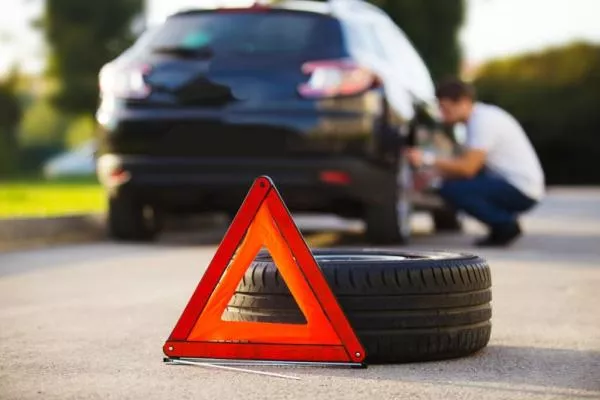Tire blowouts can get your car completely out of control, no matter how good you are as a driver. Scary as it seems, blowouts happen more frequently on highways and are also more likely to cause serious accidents due to the high speed compared to those on regular roads with speed limits.

Tire blowouts can get your car completely out of control
According to car tips and advice from experts, the tires are at risk of explosion because they are the only part of the car in direct contact with the road. Thus tires do not only have to carry the full weight of the car, but also to endure heavy impacts from the road and various objects on it when the car operates.
1. What causes a tire to blowout when driving on the highway?
In fact, there could be many causes of tire explosion and tire damage, but the most common causes are:
- Collisions at high speed with sharp objects on the road such as steel bars, stone gravel or glass that could make cuts on the tire;
- Crashing through large objects on the road that cause tire damage or tire torn (potholes, large rocks, ...);
- Too low or too high tire pressure increases the risk of tire damage and explosion in the event of a collision with foreign objects;
- Operation when tires have already been damaged (have cuts or holes) or were improperly patched;

There are many causes of tire damage and tire explosion
- Operation when tires are worn out (low tire tread depth);
- The impact of weather (e.g when the road is too hot) or chemicals (e.g ozone or oil);
- Cracking, rupture or leakage in the valve could lead to quick reduction in tire pressure;
- The high speed enlarges the impacts of outside factors on the tire.
>>> Related posts:
- When should I replace my tires & How to buy suitable ones?
- How to prolong the lifespan of the tire?
- [Video] Step-by-step instructions on how to change your car tires
2. How to safely handle tire explosion on the highway?
How to Handle a Tire Blowout
To prevent accidents when the tire blows out on the freeway, as shared by experienced drivers, the driver should calmly take the following steps:
- Instead of pushing the brakes, step on the accelerator pedal firmly for a few seconds to help the car run straight without being diverted. Do not hold the brakes for too long to avoid skidding.
- If the rear tire is blown, the driver slowly and repeatedly use brakes to slow down and pull the car over the side of the road. When braking, keep calm because the vehicle can shake violently, making it difficult to control.

Hold on to the wheel and keep the car straight
- If the front tire is blown, the situation is more dangerous than the rear tire because it will be very difficult to steer. You must hold firmly onto the steering wheel and use force to keep the car running straight. When the car regains balance and slows down, absolutely don’t hurry to push the brake pedal, because even when the car is running very slowly, the sudden braking can cause deviation. Instead, patiently and gently brake until the car stops.
>>> Click here to get more useful tips and advice for a safe driving










